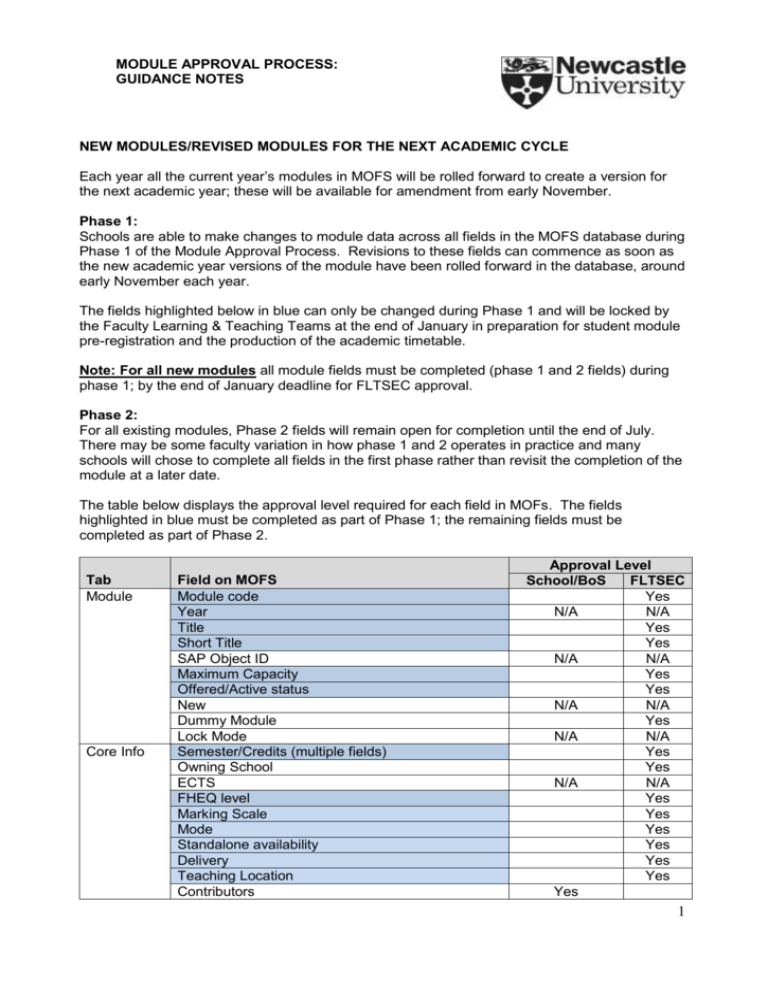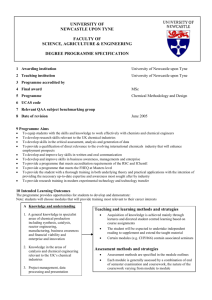MODULE APPROVAL: GUIDANCE NOTES
advertisement

MODULE APPROVAL PROCESS: GUIDANCE NOTES NEW MODULES/REVISED MODULES FOR THE NEXT ACADEMIC CYCLE Each year all the current year’s modules in MOFS will be rolled forward to create a version for the next academic year; these will be available for amendment from early November. Phase 1: Schools are able to make changes to module data across all fields in the MOFS database during Phase 1 of the Module Approval Process. Revisions to these fields can commence as soon as the new academic year versions of the module have been rolled forward in the database, around early November each year. The fields highlighted below in blue can only be changed during Phase 1 and will be locked by the Faculty Learning & Teaching Teams at the end of January in preparation for student module pre-registration and the production of the academic timetable. Note: For all new modules all module fields must be completed (phase 1 and 2 fields) during phase 1; by the end of January deadline for FLTSEC approval. Phase 2: For all existing modules, Phase 2 fields will remain open for completion until the end of July. There may be some faculty variation in how phase 1 and 2 operates in practice and many schools will chose to complete all fields in the first phase rather than revisit the completion of the module at a later date. The table below displays the approval level required for each field in MOFs. The fields highlighted in blue must be completed as part of Phase 1; the remaining fields must be completed as part of Phase 2. Tab Module Core Info Field on MOFS Module code Year Title Short Title SAP Object ID Maximum Capacity Offered/Active status New Dummy Module Lock Mode Semester/Credits (multiple fields) Owning School ECTS FHEQ level Marking Scale Mode Standalone availability Delivery Teaching Location Contributors Approval Level School/BoS FLTSEC Yes N/A N/A Yes Yes N/A N/A Yes Yes N/A N/A Yes N/A N/A Yes Yes N/A N/A Yes Yes Yes Yes Yes Yes Yes 1 External Organisations Equivalent Modules Pre-Requisite Modules and Comments Co-Requisite Modules and Comments Content Programme Relationships (summary) Summary Availability Aims (to include Summary) Outline of Syllabus Study Abroad Learning Intended Knowledge Outcomes Outcomes Intended Skill Outcomes Graduate Skills Framework Teaching Teaching & Learning Methods (inc other methods) Methods Jointly Taught Rationale of Teaching Methods and Relationship to Learning Outcomes References References (read only- populated from library list) Assessment Exams Exam Resits Exam Pairings Exam Pairings Resits Other assessments Other assessment Resits Zero weighted Pass/Fail assessments Zero weighted Pass/Fail assessment resits Formative Assessments Assessment Rationale and Relationship Exempt from assessment tariff (faculty only) Exempt from assessment tariff date (faculty only) Exempt from assessment tariff comment HESA HESA data Additional General Notes Data Immunisation Requisites Yes Yes Yes Yes N/A Yes Yes Yes Yes Yes Yes Yes N/A Yes Yes Yes N/A Yes Yes N/A N/A N/A Yes N/A Yes Yes Yes Yes Yes Yes Yes Yes N/A N/A Yes Yes N/A INSTRUCTIONS FOR SUBMITTING MODULE CHANGES The MOFS database is the corporate database for all module information providing definitive module data across the University and data feeds to a number of other University management information systems. All modules are created and maintained in the database and the approval process is integrated within the system to provide a secure environment. All new or revised modules must be approved by the Board of Studies or other appropriate school committee. All new or revised modules will be considered for approval at faculty level on behalf of FLTSEC. For instructions on how to submit module documentation please see Faculty guidance. MOFs LOCKING MECHANISM The revised MOFs database features some new locking mechanisms to facilitate the management of the two phase approval process. The lock facility allows phase 1 fields to be locked whilst phase 2 fields remain open to schools. The lock facility also allows fields to remain open to School Managers/ Administrators (or nominee by arrangement) whilst being closed to all other school based staff. This was developed in response to feedback from School Managers/Administrators who required the functionality to lock the database to wider school staff for validation before submission to the Faculty Learning & Teaching Teams. All fields remain unlocked to Faculty and LTDS users at all times. 2 The table below outlines the lock functionality. Lock Status Unlocked Phase 1 School Locked Phase 1 Locked Phase 2 School Locked Phase 2 Locked Description Total unlock – all fields are unlocked to all users All Phase 1 fields are locked to all users except School Managers/Admins with permission All Phase 1 fields are locked to all users All Phase 1 and 2 fields are locked to all users except School Managers/Admins with permission All Phase 1 and 2 fields are locked to all users. The following fields remain unlocked throughout the year and can be amended by School staff at any time; Contributors General Notes Users are reminded that if changing these fields during the academic year they should reset the BoS approved flag to ticked and upload the module to SAP. Failure to do this may result in the amended information being missed off data feeds into other related systems. The following fields are populated by other databases and are read only in MOFS: Programme Relationships (read only – updated via SAP SLcM) Reading Lists (read only – updated via Library online reading list) CREDIT ACCUMULATION AND TRANSFER SCHEME (CATS) – STANDALONE / DUAL MODE MODULES Requests for a new or revised CATS module that will be delivered on a dual mode or standalone basis should be amended in the MOFS database as detailed above. In addition a completed Module Approval Form must be submitted to the Faculty Learning & Teaching Team in order to ensure the essential quality assurance mechanisms are in place. ALLOCATION OF NEW MODULE CODES Where appropriate schools should allocate a module code using the agreed coding system – refer to the Module Outline Guidelines and any internal school coding conventions. If uncertain, please contact Faculty Learning & Teaching Teams for advice. New module codes should be allocated in the following circumstances: Creation of a totally new module; Approval of extensive revisions to an existing module (e.g. a change in total credits); Where a module is offered more than once in any academic year a different code will be required for each occurrence. FACULTY LEARNING & TEACHING TEAMS: HSS FMS SAgE CrossFaculty Christine O‘Hara (Christine.Ohara@ncl.ac.uk) Ext.83942 Lynn Oakes (Lynn.Oakes@ncl.ac.uk) Ext. 85595 Laura Johnson (SAgE.Quality@ncl.ac.uk) Ext.88516 Janice Trewick (Janice.Trewick@ncl.ac.uk) Ext.88359 http://www.ncl.ac.uk/hss/internal/teaching/ModuleApproval.htm http://www.ncl.ac.uk/internal/medicine/teaching/teaching.phtml http://www.ncl.ac.uk/sage/internal/teaching/admin/modules/ http://www.ncl.ac.uk/quilt/committees/faculty/ Last revised: August 2015 3








